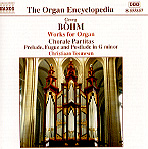The tricky task of recording pipe organs–which necessarily requires accommodating the idiosyncrasies of both instrument and the venue where it happens to reside–usually is left to specialists, from labels such as Priory, Organ Historical Society, Gothic, Raven, Harmonia Mundi, etc. But if you take a look at the huge and varied Naxos catalog you’ll see an impressive number of organ titles, many of them featuring rare and/or previously unrecorded repertoire. Although this collection of works by Bach contemporary Georg Böhm (1663-1733) is neither rare nor previously unrecorded, it’s one of a handful of discs dedicated to his music (Daniel Fuchs on Gall is another) and is part of an apparent series that will exclusively feature his organ compositions. Whether or not Böhm was one of Bach’s teachers (C.P.E. Bach’s reference to this in his oft-cited letter of 1775 may not have been accurate), they certainly were acquaintances, and in the older composer’s preludes and fugues and chorale-based works we can see probable influences on Bach’s early efforts in the genre.
The chorale partitas, which organist Christiaan Teeuwsen explains were “an innovation by Böhm”, show the composer’s near-limitless capacity for variation and invention surrounding a given melody, all the while challenging the organist to set off each section with registrations that will sustain interest and properly delineate the various lines. The fugues offer that irresistible mix of grandeur and forward drive we most associate with Bach’s own works, even if the structures are far less awesome and their effect less impressive, both technically and in terms of musical creativity.
Teeuwsen, Canadian-born and educated in the U.S. and The Netherlands, is a fine colorist and a first rate technician whose experience as a concert organist obviously has granted him a confident playing style and a keen understanding of how to use registration and keyboard/pedal articulation to keep the music lively and interesting for listeners who more than likely can’t see the performer at work. Occasionally he over-defines phrase endings with a kind of halting gesture that interrupts an otherwise flowing line, but some of these effects could be associated with the requirements of this organ’s action. The instrument, the Reil organ at Bovenkerk Kampen, The Netherlands, is nevertheless well-suited to these pieces, with its refined, unobtrusive upper and middle registers, the flutes mellifluous, the reeds more assertive yet still warm, and bass and pedal that support but don’t overpower. Of course, much of this sound has to do with Teeuwsen’s decisions regarding specific choices of stops–and to the skill of the engineers in faithfully capturing all the variables, from the instrument’s complex array of timbres and wide dynamic range to the quirks of the church’s acoustic space. If you’re interested in music of this style and period, from a composer who played an important role in the development of organ style and repertoire, this bargain-priced release will not disappoint. On to Volume 2!
































